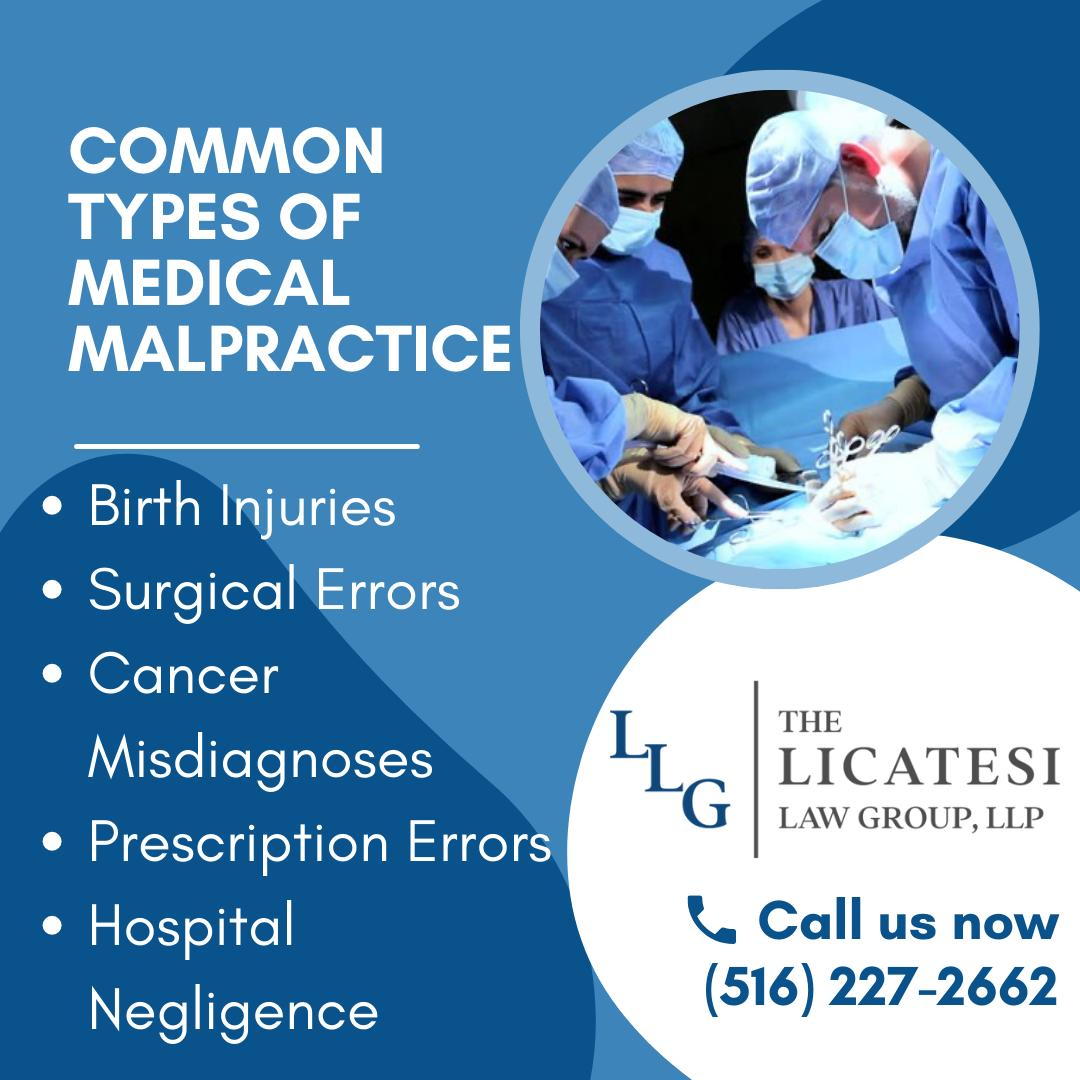
- posted: Aug. 05, 2024
- Medical Malpractice
Medical malpractice poses a problem, with reaching effects on numerous individuals and families each year. Birth complications and errors during surgery serve as examples of inadequacy. The Licatesi Law Group stands dedicated to advocating for the rights of patients who have suffered harm due to medical malpractice. This blog aims to explore the intricacies of malpractice, types of injuries resulting from such negligence, the parties held accountable for these incidents and the available legal options for those affected.

Medical malpractice refers to the failure of a healthcare provider to meet the expected level of care that a reasonably skilled expert would have supplied in identical circumstances. Such divergence from the established standard of treatment might lead to severe harm or even the death of the patient. In order to establish a medical malpractice case, it is necessary to prove four essential elements: firstly, that the healthcare provider had a responsibility to provide care to the patient; secondly, that the provider failed to meet the expected standard of care; thirdly, that this failure directly caused the patient's injury; and finally, that the patient experienced actual harm or damages as a direct result of the provider's breach.
Medical negligence can result in a range of injuries, some of which can have profound and permanent consequences. Typical birth injuries may involve cuts on a newborn's face following a cesarean section delivery. Cesarean sections are prevalent, yet they entail potential hazards. Insufficient caution by the surgeon may result in lacerations, leading to enduring scarring and emotional distress for both the child and the parents. Within the domain of surgical errors, a particularly egregious form of negligence pertains to the inadvertent retention of foreign objects within a patient's body following a surgical procedure. This can result in serious infections, internal harm, and the requirement for further surgical procedures.
Incorrect diagnoses are another significant problem in cases of medical negligence. Delayed or incorrect diagnosis can impede the timely and suitable treatment of a patient, resulting in the advancement of the disease, deterioration of the condition, or potentially even death. Frequently misdiagnosed ailments encompass cancer, myocardial infarctions, and infectious diseases. In addition, medication errors, such as prescribing an incorrect medication, administering an improper dosage, or neglecting to take into account a patient's allergies and potential interactions with other medications, can result in significant repercussions for the patient's well-being and recuperation.
Assessing responsibility in medical malpractice cases can be intricate and frequently entails numerous parties. Physicians and surgeons have the duty to deliver proficient healthcare and adhere to established protocols during medical treatment and surgical procedures. Nurses and medical personnel are required to precisely administer medications, closely monitor patients, and promptly communicate any concerns to the attending physician. Hospitals and medical facilities may be legally responsible for their failure to ensure a secure environment, insufficient staffing, or the employment of incompetent healthcare professionals. In addition, pharmaceutical companies can be held responsible if a medication error occurs due to a manufacturing flaw or insufficient information regarding potential side effects.
If you or someone you care about has experienced medical malpractice, it is essential to promptly take steps to safeguard your legal entitlements and seek reparation for your injuries. Immediately, prioritize obtaining medical assistance to address any injuries or complications arising from the malpractice. Prioritizing your well-being and safety is of utmost importance. Subsequently, ensure comprehensive documentation by gathering and safeguarding all pertinent medical records, treatment plans, and correspondence with healthcare providers, as this documentation is crucial for constructing your legal argument.
It is crucial to seek the advice of a seasoned medical malpractice lawyer, as these lawsuits are intricate and necessitate skilled legal counsel. An attorney will assist you in submitting a medical malpractice lawsuit within the legally specified time limit, typically two and a half years from the occurrence of the malpractice in New York. Nevertheless, the duration of this period can fluctuate depending on the particularities of the case. The Licatesi Law Group possesses a wealth of expertise in managing medical malpractice claims and is capable of providing adept guidance throughout the legal proceedings. We will perform a comprehensive inquiry to ascertain the root cause of the malpractice and pinpoint all responsible parties. We will collect and safeguard vital evidence, such as medical records, expert testimonies, and witness statements. In addition, we will manage all correspondence with insurance companies to guarantee that you obtain equitable recompense for your injuries and, if required, advocate on your behalf in court to obtain the rightful justice.
Medical negligence, specifically birth injuries and surgical mistakes, can result in severe repercussions for patients and their families. The Licatesi Law Group is dedicated to advocating for the rights of individuals impacted by medical malpractice. If you or someone you care about has experienced harm as a result of medical negligence, please reach out to us now to schedule a complimentary consultation. Our purpose is to assist you in understanding and managing the intricacies of your case, while guaranteeing that you obtain the appropriate compensation and justice that you are entitled to. Call us today at (516) 227-2662.


